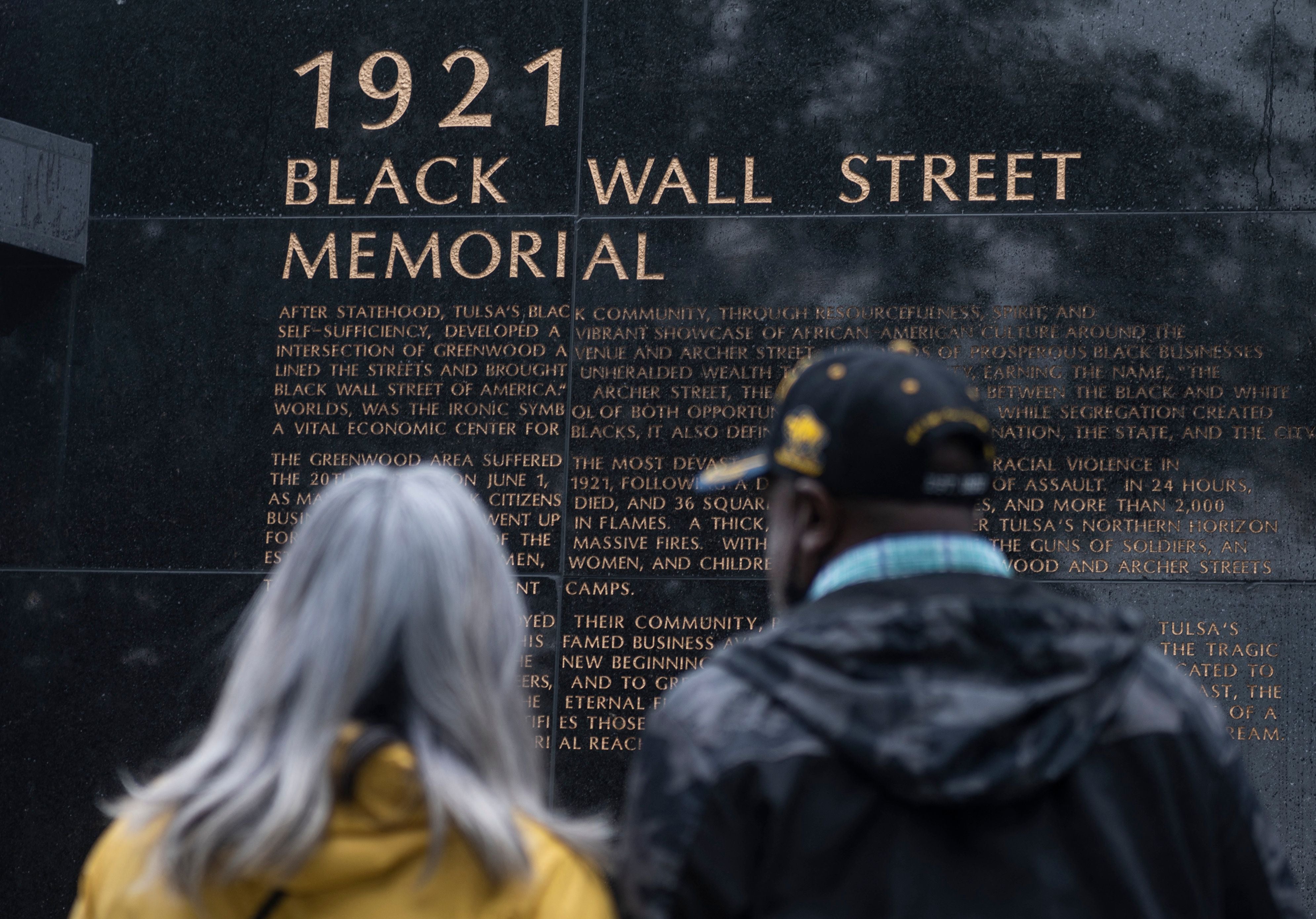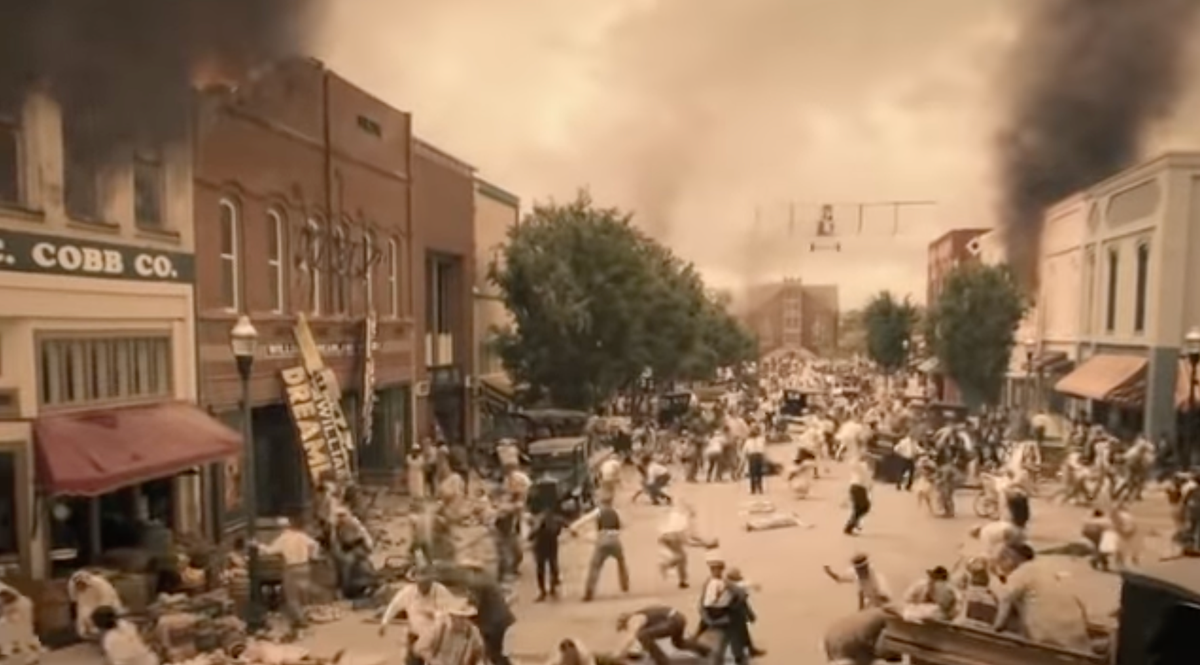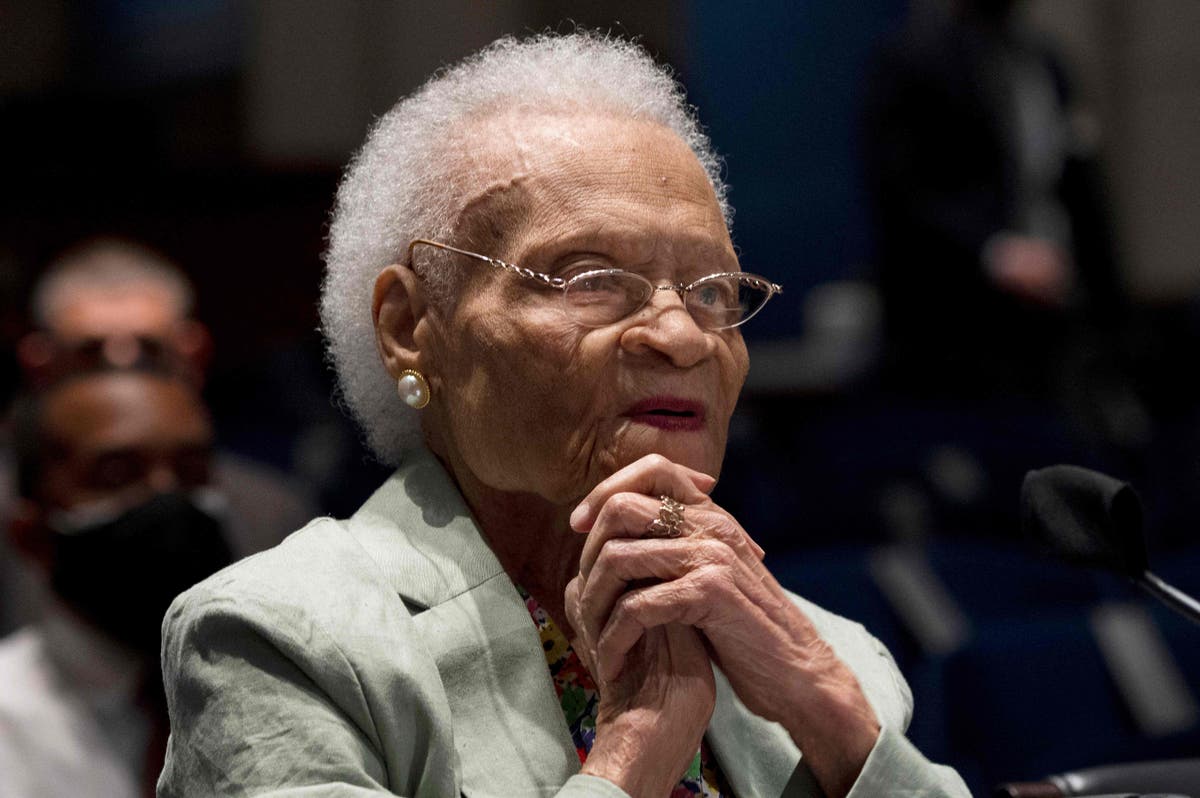Tulsa news: ‘Literal hell unleashed’ on Black residents, Biden says in address on massacre anniversary
President delivers remarks as community recognises 100th anniversary of catastrophic racist violence

Your support helps us to tell the story
From reproductive rights to climate change to Big Tech, The Independent is on the ground when the story is developing. Whether it's investigating the financials of Elon Musk's pro-Trump PAC or producing our latest documentary, 'The A Word', which shines a light on the American women fighting for reproductive rights, we know how important it is to parse out the facts from the messaging.
At such a critical moment in US history, we need reporters on the ground. Your donation allows us to keep sending journalists to speak to both sides of the story.
The Independent is trusted by Americans across the entire political spectrum. And unlike many other quality news outlets, we choose not to lock Americans out of our reporting and analysis with paywalls. We believe quality journalism should be available to everyone, paid for by those who can afford it.
Your support makes all the difference.President Joe Biden travelled to Tulsa, Oklahoma on Tuesday to mark the 100th anniversary of one of the bloodiest episodes of racist violence in the US, when a white mob destroyed 35 blocks of a flourishing Black neighbourhood in Greenwood, displaced thousands of residents, and killed as many as 300 people within 14 hours beginning on 31 May, 1921.
The president – the first within the last century to address the massacre from Tulsa – also met with the three known living survivors, who continue to press for justice for the atrocities.
“As painful as it is, only in remembrance do wounds heal,” the president said in his remarks, arguing for a national recognition of the country’s history of racist violence.
The US must “come to terms with its dark side” as other great nations do, he said.
“We just have to choose to remember,” he said. “Memorialise what happened here in Tulsa so it can’t be erased.”
The anniversary of the attack also has revived discussions about the decades of systemic injustice that followed, not just in Tulsa but across the US, as the White House unveils a new series of proposals and administration goals aimed at repairing discriminatory policies and reversing the white-Black wealth gap.
“Disinvestment in Black families in Tulsa and across the country throughout our history is still felt sharply today,” the White House said.
Thousands of people have gathered in Tulsa to commemorate the anniversary at vigils, memorials, discussions and other events.
Follow live updates as they happened below
A white mob killed hundreds of Black people in Tulsa 100 years ago. Survivors still demand justice
Tulsa’s Greenwood was a place of possibility and prosperity for Black Americans following decades of enslavement, racist violence and legalised discrimination in a Jim Crow-era marked by public lynchings and the beginnings of mass incarceration emerging from slavery.
Within two days, a white mob reduced it to rubble.
The community’s long road to recovery would suffer the same systemic impacts of racial violence that reverberated across the US throughout the 20th century, from redlining and construction of highways through Black neighbourhoods to “urban renewal” initiatives and the use of eminent domain to seize Black-owned property.
I wrote about the long shadow of injustice and what’s next on the massacre’s 100th anniversary:

A white mob killed hundreds of Black people in Tulsa 100 years ago. Survivors still demand justice
Biden urges Americans to reflect on ‘deep roots of racial terror’ amid calls for reparations
Joe Biden issued a proclamation on Memorial Day to mark the 100th anniversary of the massacre.
“I call on the American people to reflect on the deep roots of racial terror in our nation and recommit to the work of rooting out systemic racism across our country,” the president said.
He also urged the federal government to “reckon with and acknowledge the role that it has played in stripping wealth and opportunity from Black communities.”

Biden urges Americans to reflect on ‘deep roots of racial terror’ marking Tulsa massacre anniversary
Biden unveils new plans to close racial wealth gap ahead of Tulsa visit
Biden will announce a new set of administration policies to close the white-Black wealth gap in the US during a speech in Tulsa on Tuesday.
The administration takes aim at addressing disparities in home ownership and appraisals, and will lean on the federal government’s purchasing power to expand federal contracting with small disadvantaged businesses
Details here:

Biden unveils new plans to close racial wealth gap ahead of Tulsa visit
How HBO’s Watchmen brought back ‘forgotten’ tragedy to the mainstream
HBO’s Watchmen series opens with a visceral imagining of the Tulsa race massacre, putting atrocities that have been whitewashed for years on TV screens for one of the first times.
Read more:

How HBO’s Watchmen brought back ‘forgotten’ Tulsa race massacre to the mainstream
Now in their hundreds, three survivors of the1921 Tulsa race massacre testified to Congress. Here’s what they told lawmakers
The three known survivors of the 1921 massacre testified to Congress on 19 May to continue their community’s calls for justice and reparations.
“Greenwood should have given me the chance to truly make it in this country, but in a few hours all of that was gone,” said 107-year-old Violet Fletcher, who was seven years old when she was forced to leave her home in Tulsa in the middle of indiscriminate violence and bombing.
It is worth watching their remarks in full, linked below:

‘I hear the screams’: Survivors of 1921 Tulsa race massacre testify to Congress in call for justice
Hundreds gather at historic Tulsa church's prayer wall
On Monday, hundreds of people gathered at Tulsa’s Vernon African Methodist Episcopal Church, where survivors continued to attend services in the basement as the community rebuilt after the 1921 massacre.
Revs Jesse Jackson and William Barber joined local faith leaders and other civil rights figures at the church to mark the massacre’s centennial.
Read more here:

Hundreds gather at historic Tulsa church's prayer wall
How the press and white officials explained the massacre in 1921
The centennial of the racist massacre in Tulsa has revived discussions about its whitewashed past and the persistence of white supremacism in the institutions that kept its history in the dark for decades.
On 31 May, 1921, the Tulsa Tribune published the headline “Nab Negro for Attacking Girl in an Elevator” after 19-year-old Black man Dick Rowland was arrested and “charged with attempting to assault the 17-year-old white elevator girl” in a department store building. It is believed he tripped and bumped into her.
Hours later, a lynch mob formed at the courthouse where he was held.
Black World War I veterans defended the courthouse. A fight broke out, spawning one of the worst episodes of racist violence in the US.
The offices of the city’s two Black-owned newspapers – The Tulsa Star and Oklahoma Sun – were also destroyed.
Black newspapers published an account from the NAACP’s Walter F White, who visited Tulsa in the aftermath, and several large newspapers ran front-page stories about the massacre.
But local reports from the Tribune and World , along with city leadership, blamed the massacre on Black residents. The World ran an editorial headline on 4 June titled “Bad N******” and told Black residents to protect themselves against “worthless Negroes”.
An editorial in the Tribune on 4 June argued that “such a district as the old ‘N*****town’ must never be allowed in Tulsa again.”
Here is a thread about how local white clergy members responded to the attack:
After city cancels concert, John Legend announces support for reparations
A “Remember and Rise” concert organized by the Tulsa Race Massacre Centennial Commission was cancelled after negotiations between officials and lawyers for the last known survivors over reparations had fallen apart.
John Legend was scheduled to perform, and voting rights advocate Stacey Abrams was to deliver a keynote address.
Mr Legend issued a statement on 30 May supporting “a true reckoning and reparations for the survivors and their descendants”:
What justice looks like for the family of Terence Crutcher, fatally shot by Tulsa police
Tiffany Crutcher, whose twin brother Terence Crutcher was fatally shot by Tulsa police in 2016, tells PBS correspondent Yamiche Alcindor what repartitions and true justice looks like for Tulsa 100 years after a racist massacre:
Read more from PBS.
Why Oklahoma’s governor was removed from the Tulsa massacre commission
A commission founded to commemorate the 100th anniversary of the Tulsa race massacre removed Oklahoma’s Republican Governor Kevin Stitt from the panel last month, after the governor signed into law a controversial measure that restricts how public schools can teach about race.
Opponents of the law – which invokes GOP “critical race theory” attacks that have swept Republican-dominated legislatures in the wake of the 2020 election – argue that the policy will have a chilling effect on how students learn about racism as well as the history of the massacre in their own state.
After signing the legislation, the commission called his support for the law “a sad day and a stain on Oklahoma.”
Commissioner Phil Armstrong said he was “gravely disappointed” that neither the governor or other officials from his office discussed the measure with the panel. Mr Armstrong said the measure is “diametrically opposite to the mission of the Centennial Commission and reflects your desire to end your affiliation.”
Join our commenting forum
Join thought-provoking conversations, follow other Independent readers and see their replies
Comments